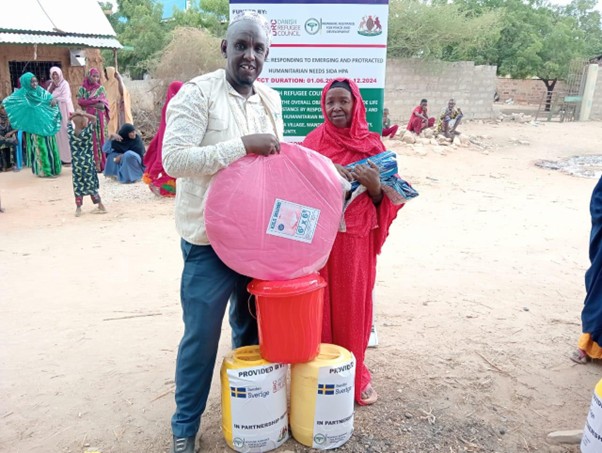
Khalicha Village in Mandera North, Mandera County, has always been a place of resilience. Locally referred to as the “clean village,” Khalicha earned this reputation when its residents made the bold step to ban the sale and use of khat, a stimulant widely consumed in the region. This collective action set Khalicha apart, prioritizing positive social change. However, even Khalicha’s progressive outlook hasn’t shielded it from the harsh realities of protracted humanitarian needs. The community has faced devastating flash floods and unprecedented droughts, which have led to deteriorated hygiene and sanitation conditions, leaving households vulnerable to waterborne diseases such as cholera and diarrhea. The UN reports that due to unsafe water, sanitation, and poor hygiene, over 700 children under five years old die from diarrhoea every day.
In response to these challenges, Nomadic Assistance for Peace and Development (NAPAD), in partnership with the Danish Refugee Council (DRC) and funding from SIDA (Swedish International Development Cooperation Agency), launched a life saving Water, Sanitation, and Hygiene (WASH) project to support communities in Khalicha village, aimed at improving their access to safe drinking water.
Halima Issaq’s household is one of the 100 who received critical WASH supplies, including soap, jerrycans, mosquito nets, and aqua tabs These items have impacted her family’s health and daily life. The jerrycans have made collecting and safely storing treated water easier for drinking and domestic use, while the mosquito nets are protecting her children from mosquito-borne illnesses during this rainy season.

“I didn’t know how much we needed these items until we got them,” Halima said. “The mosquito nets have been a lifesaver during this rainy season.” She continued
Beyond providing these supplies, NAPAD conducted training sessions to ensure that Halima and members of her community knew ow to use them effectively. This participatory approach also emphasized social behaviour change, ensuring that the community integrates these practices into their daily lives, even after the project concludes.
To celebrate World Toilet Day, a day set aside worldwide to raise awareness about the importance of sanitation in reducing diseases and creating healthier communities, community health volunteers raised awareness on the importance of good hygiene and sanitation and proper toilet use towards disease prevention.
“The event was a chance for us to talk about what we can do to improve sanitation in our homes,” said Mohamed Adan, a local health officer. “It’s the little things, like keeping washing our hands with clean water and soap properly, that can prevent so many diseases.”
For Halima, the event was a turning point. She left inspired and committed to improving her home’s sanitation practices, recognizing the direct link between good hygiene and her family’s health.
